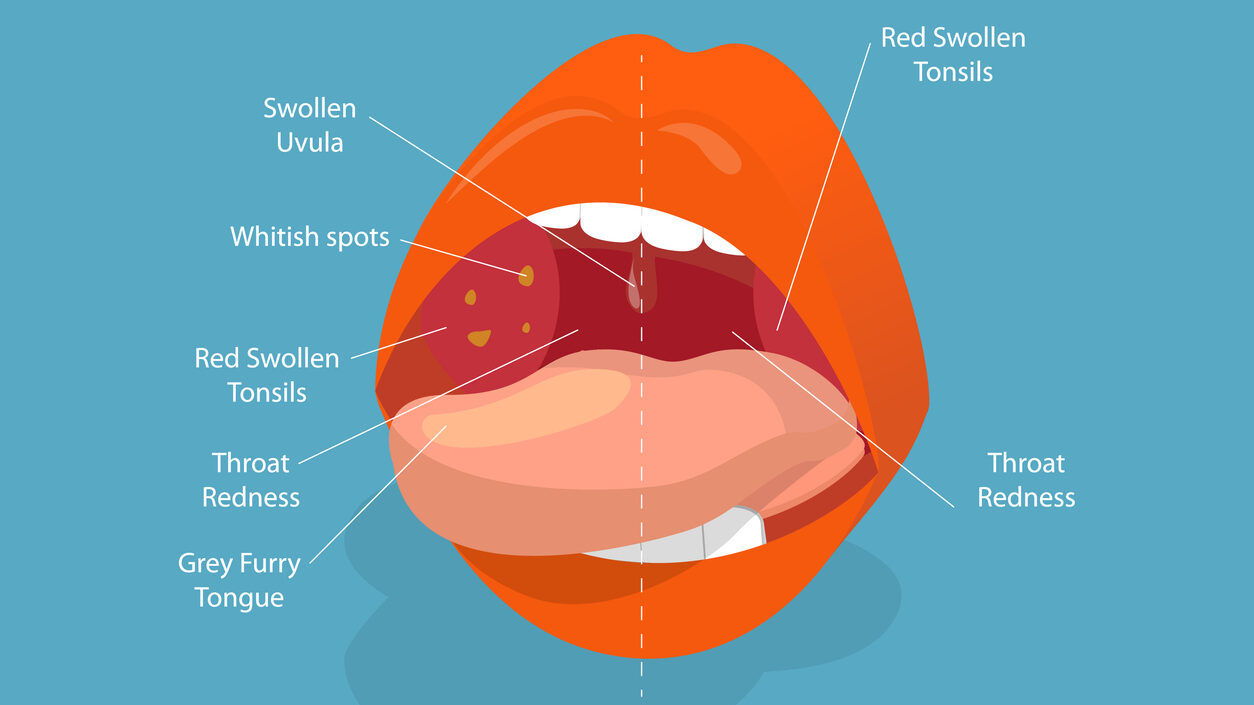What is strep throat?
Strep throat is a bacterial infection in your throat and tonsils (the lymph nodes in the back of your mouth) that can make your throat feel sore and scratchy. Strep throat accounts for only a small portion of sore throats (pharyngitis).
If untreated, strep throat can cause complications, such as kidney inflammation or rheumatic fever. Although instances of rheumatic fever are rare, it is important to seek treatment right away as rheumatic fever can cause permanent damage to your heart.
Strep throat is most common in children, but it affects people of all ages. If you or your child has signs or symptoms of strep throat, see a doctor for prompt evaluation and treatment.

Strep Throat Symptoms
Signs and symptoms of strep throat can include:
- Throat pain that usually comes on quickly
- Painful swallowing
- Red and swollen tonsils, sometimes with white patches or streaks of pus
- Tiny red spots on the area at the back of the roof of the mouth (soft or hard palate)

- Swollen, tender lymph nodes in your neck
- Fever or chills
- Headache
- Rash
- Nausea or vomiting, especially in younger children
- Body aches
It’s possible for you or your child to have many of these signs and symptoms but not have strep throat. The cause of these signs and symptoms could be a viral infection or some other illness.
Treatment & Prevention
Streptococcal bacteria are highly contagious. They can spread through droplets when someone with the infection coughs or sneezes. You can also pick up the bacteria from any surface you touch and transfer them to your nose, mouth or eyes, so it is important to maintain proper handwashing techniques to help reduce your risk and avoid direct contact with those who are sick. You should also avoid sharing food, eating utensils or drinks.
It’s also possible for you to be exposed to a person who carries strep but shows no symptoms, which is why you should be evaluated by a provider who can assess and treat you if you believe that you have strep, as it can lead to serious complications if left untreated. Antibiotic treatment reduces the risk of complications.
If diagnosed with strep, a provider will prescribe an oral antibiotic such as Penicillin or Amoxicillin. Additionally, your provider may recommend other measures to help reduce pain and fevers including over the counter pain relievers such as Ibuprofen or Acetaminophen, gargling with warm salt water, drinking plenty of water, and using honey to help soothe the throat.
Fun Fact!
If you had your tonsils removed, you can still get strep throat! Tonsil removal does not make you immune to strep; however, it does significantly reduce the risk of developing strep and severity of symptoms.
Experiencing a sore throat or other strep symptoms?
Schedule your appointment today and get the care and treatment you need!
Schedule Appointment